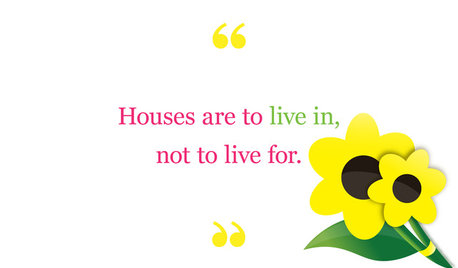OK parents: should kids learn to say, 'I'm sorry?'
halfdecaf
17 years ago
Related Stories

FUN HOUZZEverything I Need to Know About Decorating I Learned from Downton Abbey
Mind your manors with these 10 decorating tips from the PBS series, returning on January 5
Full Story
KIDS’ SPACES5 Ideas for a Great Home Learning Zone
Get your child off to a good start this school year with homework areas and strategies that reduce the frenzy
Full Story
FEEL-GOOD HOME12 Very Useful Things I've Learned From Designers
These simple ideas can make life at home more efficient and enjoyable
Full Story
DECORATING GUIDES10 Design Tips Learned From the Worst Advice Ever
If these Houzzers’ tales don’t bolster the courage of your design convictions, nothing will
Full Story
KIDS’ SPACESWho Says a Dining Room Has to Be a Dining Room?
Chucking the builder’s floor plan, a family reassigns rooms to work better for their needs
Full Story
MOTHER’S DAYWhat We've Learned From Mom About Home
Share cherished memories as Houzzers recall the special traits, insights and habits of their mothers
Full Story
FUN HOUZZGuessing Game: What Might Our Living Rooms Say About Us?
Take a shot on your own or go straight to just-for-fun speculations about whose homes these could be
Full Story
LIFE10 Steps for Saying Goodbye to Sentimental Objects
Are keepsakes cluttering your space and your life? Consider this approach for letting go and moving on
Full Story
LIFEThe Day She Learned the Serenity Prayer for Homeowners
A flooded house and a high school graduation party intersect to teach some life lessons
Full Story
LANDSCAPE DESIGNCalifornia Says Goodbye to the Sprawling Ornamental Lawn
New state rules will effectively limit turfgrass to 25 percent of the landscape in most new and renovated yards
Full Story









igloochic
claire_de_luna
Related Professionals
Bethpage Kitchen & Bathroom Designers · Palmetto Estates Kitchen & Bathroom Designers · Rancho Mirage Kitchen & Bathroom Designers · Holden Kitchen & Bathroom Remodelers · Panama City Kitchen & Bathroom Remodelers · Schiller Park Kitchen & Bathroom Remodelers · Canton Cabinets & Cabinetry · Red Bank Cabinets & Cabinetry · Spring Valley Cabinets & Cabinetry · Baldwin Tile and Stone Contractors · Charlottesville Tile and Stone Contractors · Green Valley Tile and Stone Contractors · Turlock Tile and Stone Contractors · Gardere Design-Build Firms · Yorkville Design-Build Firmsjubileej
paulines
lowspark
doc8404
halfdecafOriginal Author
sue36
Gina_W
kitchenobsessed
seekingadvice
redbazel
jubileej
jubileej
talley_sue_nyc
kailuamom
igloochic
seekingadvice
kailuamom
halfdecafOriginal Author
abfab
sharon_sd
halfdecafOriginal Author
redbazel
paulines
igloochic
halfdecafOriginal Author